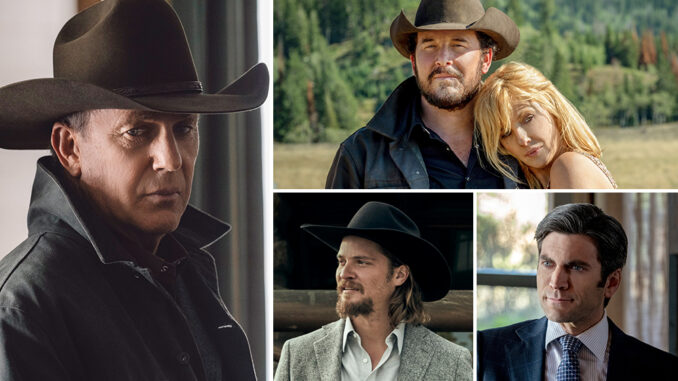
From Dutton's Legacy to New Conflicts: Decoding the Yellowstone Spinoffs
Yellowstone, the brainchild of Taylor Sheridan, has erupted into a sprawling universe, a modern-day Western epic that resonates with audiences fascinated by the allure of rugged individualism, familial loyalty, and the constant struggle for survival. While the original series focuses on John Dutton's desperate fight to maintain his family's sprawling ranch in Montana, the subsequent spinoffs, "1883," "1923," and the upcoming "6666," delve deeper into the Dutton lineage and the challenges they faced across generations. By examining these prequels and expansions, we can decode not just the historical context of the Dutton ranch, but also the recurring themes of violence, ambition, and the relentless pursuit of the American Dream that define their legacy.
John Dutton's legacy in Yellowstone is inextricably linked to the land. He is a staunch protector of the Yellowstone Ranch, a fiercely independent patriarch who believes in doing whatever it takes to preserve his family's heritage. This unwavering commitment, however, often translates into morally ambiguous choices, fueling conflicts with developers, environmentalists, and Native American tribes who also lay claim to the land. John's perspective is deeply rooted in tradition, a reverence for the past that blinds him to the shifting sands of the present. The spinoffs offer a vital counterpoint, showcasing the sacrifices and hardships that shaped his worldview and ultimately paved the way for the ranch's existence.
"1883" serves as a brutal origin story, tracing the Dutton family's arduous journey from Fort Worth, Texas, to Montana in search of a better life. Led by James Dutton, John Dutton's great-grandfather, the series depicts the realities of westward expansion, highlighting the dangers of disease, banditry, and the unforgiving wilderness. "1883" humanizes the Duttons, stripping away the modern comforts and complexities to reveal their raw grit and determination. It reveals that the idyllic vision of the American West was built on a foundation of immense suffering and loss. The series underscores a key theme: the Duttons' unwavering determination to survive, a trait inherited by John Dutton, which often manifests as ruthlessness. The conflicts in "1883" are primarily external, born from the harsh environment and hostile forces, highlighting the constant struggle for survival that shaped the Dutton's worldview.
"1923" picks up the story in the interwar period, following Jacob and Cara Dutton, John Dutton's great-uncle and aunt, as they grapple with the challenges of drought, economic depression, and the rising power of cattle barons. This series broadens the scope beyond the immediate family, introducing new antagonists and exploring the complex dynamics of the early 20th-century West. "1923" illustrates how the Duttons transitioned from pioneers to landowners, showcasing the inherent power struggles that arise when land becomes a commodity. The series also foreshadows future conflicts, demonstrating how economic pressures and political maneuvering can threaten the Dutton ranch's existence. Here, the conflicts are both internal and external. While they battle outside forces like cattle rustlers and the encroaching city, they also struggle with moral dilemmas and the weight of their inherited responsibilities.
The upcoming spinoff, "6666," promises to shift the focus away from the Dutton family and explore the legendary Four Sixes Ranch in Texas. While details remain scarce, the premise suggests a continuation of the Yellowstone themes, focusing on the modern-day cowboy lifestyle and the challenges of maintaining a ranching legacy in a rapidly changing world. This series could offer a fresh perspective on the contemporary West, exploring issues of land management, environmental sustainability, and the evolving role of cowboys in modern society. It suggests a move beyond the Dutton's specific legacy and a broader exploration of the pressures facing the ranching community as a whole.
In conclusion, the Yellowstone spinoffs are more than just extensions of the original series. They are historical explorations that delve into the Dutton family's past, revealing the sacrifices, conflicts, and unwavering determination that shaped their destiny. By examining these prequels and expansions, we gain a deeper understanding of John Dutton's motivations and the complex legacy he inherited. The themes of violence, ambition, and the relentless pursuit of the American Dream are woven throughout each series, showcasing the enduring power of the West and the enduring challenges of preserving a way of life in a world that is constantly changing. Ultimately, the Yellowstone universe serves as a compelling allegory for the enduring American struggle to reconcile individual ambition with the collective good, and the often-brutal cost of achieving the American Dream. Through the Duttons' story, we see a reflection of our own national identity, with all its triumphs and tribulations.
